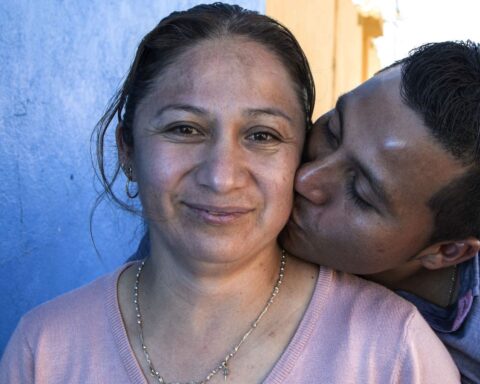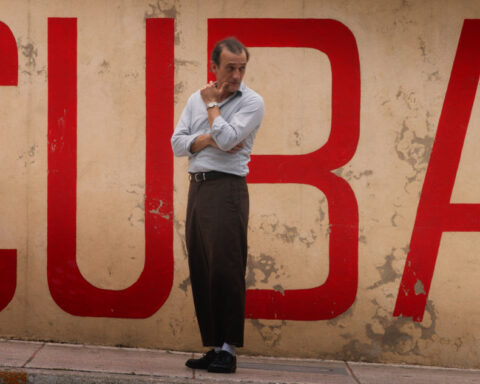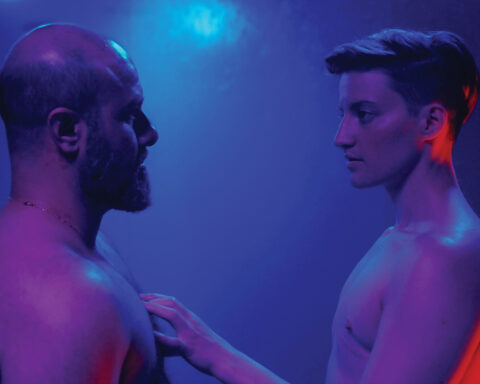Bloody Nose, Empty Pockets
Bill Ross IV and Turner Ross, directors
Featuring: Peter Elwell, Michael Martin, Shay Walker
There’s something about the authenticity of a bar that provides a superb setting for a drama. A disparate group of American desert dwellers are drawn together by the casual downbeat atmosphere of a place called The Roaring Twenties in the Ross Brothers film Bloody Nose, Empty Pockets. The bar feels slightly tawdry with its tiny dance floor and worn out couches only adding to the emotional tenor of a darkening time. The Ross Brothers—Bill and Turner—play to our expectations that the denizens of such a saloon will speak the truth about their lives either passionately or with a comic twist. After all, that’s why drinkers congregate in the same bar over and over again: to share in a community that accepts them and let’s them play out their inner lives in front of others.
Set in Las Vegas around the time of Trump’s election, it’s the closing day for The Roaring Twenties. Only the regulars are showing up and that’s not enough to pay the rent. The afternoon bartender is a classic charmer: funny and warm with a hefty but muscular frame and a very long hard-rock-style beard. The locals start drifting in—a thin, long haired older guy who’s a sometime actor, an Aussie, a black trans former regular up for a final drink, and two women start talking to each other as it becomes obvious that they’re the night staff.
The male bartender pulls out his guitar to sing Kenny Rogers’ “The Gambler” and Roy Orbison’s “Crying,” some prime country and rock’n’roll tunes. He leaves, hugging some of the “weirdos,” as the film slides into a kind of fugue state, moving from one character to another, with nothing much being resolved. With the exception of the 14-year-old son of the evening bartender, the habitués are older and not really successful in their lives. Bits and pieces of conversations with voices spilling over each other can be heard in a quirky manner that resembles an Altman film like California Split. A black war veteran finds it hard to concentrate but is a good dancer. An older white guy reluctantly reveals his marital history to a couple of the women.
Bloody Nose, Empty Pockets is less like Cheers — though everyone does know your name — and more like Barfly, the 1980s gloomy drama based on the autobiographical reminisces of underground novelist and poet Charles Bukowski. Another literary inspiration for the film is playwright Eugene O’Neill and his masterpiece, also set in a bar, The Iceman Cometh. But this film isn’t a tragedy. The drinkers are old but friendly: they’re not about to murder anybody. The part-time actor proudly tells one of the women that he waited until he was a loser before becoming an alcoholic—it meant that he lost on his own, not because of the booze. The drinkers are here to say goodbye to The Roaring Twenties, not to weep into their beers.
The Ross Brothers do have bigger fish to fry than simply showing what a down and out bar was like in 2016. The dragged out but loving drinkers at The Roaring Twenties are imbibing and telling tales as their country is becoming increasingly trivial. The television is on throughout the day, playing quiz shows and the ultimate early Vegas film, the Clark Gable and Marilyn Monroe drama The Misfits. Occasionally there are talks shows commenting about the election. The TV provides more noise and visual stimuli to the drinkers but their attention is only subliminal. They’re not going to change the politics of the U.S.—they know that they can do nothing except to continue drinking as their favourite bar closes.
That’s not all. The Ross Brothers have created a hybrid film, which they claim to be a documentary. But it’s not, though they’ve made docs in the past. The real Roaring Twenties is near New Orleans and is still running strong. The directors found bar dwellers across the U.S. and recruited them to play versions of themselves for the film. Some had been actors but most were not. Working with the directors, the people we see in the film improvised a script, which was shot in Louisiana, not Vegas. So is Bloody Nose, Empty Promises a documentary or a drama?
To me, it’s a drama, somewhat in the style of the films of the British filmmaker Mike Leigh, who is famous for his improvised scripts on such films as Secrets & Lies, Life is Sweet, Topsy Turvy and Mr. Turner. They’re not docs but like the Ross Brothers, they’re trying to arrive at a truth that isn’t a conventional drama either. The folks at Hot Docs evidently don’t agree since they’re streaming it. Why don’t you decide for yourself?
Bloody Nose, Empty Pockets is now playing in virtual cinemas.
For a second take on the film, read Pat Mullen’s review, which calls it a documentary(ish)!











